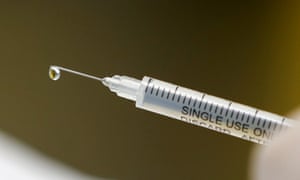Company is unclear about whether patient was receiving vaccine or placebo in 60,000-patient study

Johnson & Johnson has paused its Covid-19 vaccine trial due to an “unexplained illness” in a participant, the company confirmed.
The pharmaceutical giant was unclear if the patient was administered a placebo or the experimental vaccine, and it’s not remarkable for studies as large as the one Johnson & Johnson are conducting – involving 60,000 patients – to be temporarily paused.
In September, another trial for a vaccine developed by AstraZeneca and Oxford University was paused for a second time since trials began in April after a suspected adverse reaction in a patient. The study restarted a week afterward in UK, and in other countries since then, but remains on ice in the US.
“We have temporarily paused further dosing in all our COVID-19 vaccine candidate clinical trials,” Johnson & Johnson revealed in a statement after Stat first reported the news. “Following our guidelines, the participant’s illness is being reviewed and evaluated.”
The Johnson & Johnson trial, which was meant to yield results early next year, is one of four vaccine trials in the most advanced, phase 3 stage, and one of six coronavirus vaccines being tested in the US. Late stage vaccine trials from Pfizer and Moderna continue and are expected to yield results this year. While the vaccines under development by Moderna and Pfizer would require two doses, Johnson & Johnson’s would only require one.
Johnson & Johnson did not reveal the nature of the illness that brought its trial to a standstill, noting in a statement: “We must respect this participant’s privacy.”
“We’re also learning more about this participant’s illness, and it’s important to have all the facts before we share additional information,” the statement continued. The illness is being investigated by the company as well as an independent board.
Although top health officials have indicated that a viable vaccine is unlikely to go through trials and approval processes and be ready for mass production and distribution before next spring, Donald Trump has repeatedly promised a vaccine by or soon after election day on 3 November.

Leave A Comment